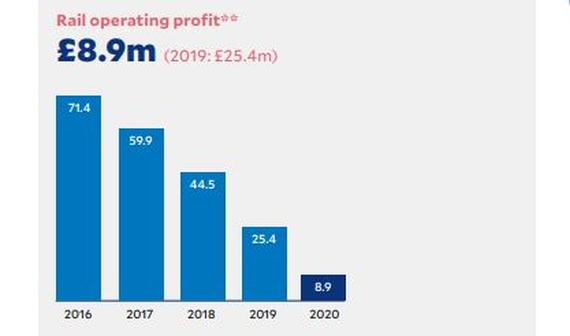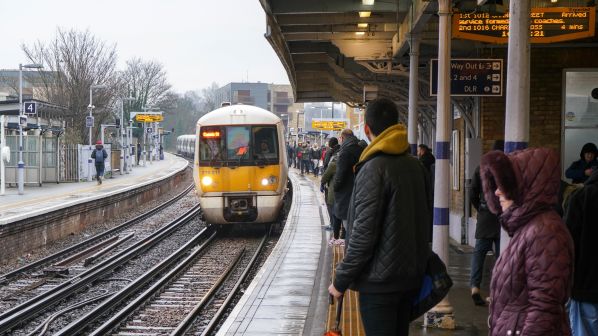Revenue from the rail division was £2.885bn, up 8% from £2.672bn in 2018-19, reflecting increased revenue from its British rail franchises and the introduction of new international contracts, while costs increased from £2.646bn to £2.876bn.
The group recorded overall revenue of £3.898bn from its bus and rail divisions, up from £3.674bn in 2018-19. The company switched from the IAS 17 to the IFRS 16 accounting system this year. Operating profit before exceptional items was £68.2m for the period using IAS 17, down from £121.1m in 2018-19, but this increased to £77.9m for 2019-20 under the IFRS 16 system.
Govia Thameslink Railway (GTR), which is run by the 65:35 Govia partnership between Go-Ahead and Keolis, generated £1.769bn in revenue for Go-Ahead, while the Southeastern franchise generated £1bn. Operations in Germany and the Nordic countries generated £51.4m and £18.5m respectively.
Go-Ahead has seen a steady decrease in profits from rail, dropping from £71.4m in 2016 to £59.9m in 2017, £44.4m in 2018, £25.4m in 2019 and £8.9m in 2020.

This decrease was driven by significant losses in Go-Ahead’s German business and the effect of lower margins in Southeastern as a result of new contractual terms early in the year and the introduction of the Covid-19-induced Emergency Management Agreements (EMA) from March 1. These factors were partially offset by an improvement in GTR following stronger operational performance, one-off gains from the close out of balances on previous rail contracts and the impact of IFRS 16, which affects the group’s rail division more significantly than other parts of the group. The operating profit margin decreased from 1% to 0.3%.
Southeastern recorded a 20.9% drop in revenue, while GTR recorded a 19.6% fall in 2019-20 due to the pandemic. This coincided with a 22.2% and 21.6% decrease in passenger numbers for Southeastern and GTR respectively. GTR recorded £24m in operating profit, followed by £9.9m in operating profit from other rail activities, while Southeastern and operations in Germany and Norway operations recorded losses of £28.5m, £28.2m, and £2.5m respectively.
Govia has a 24% share of the British rail market, behind FirstGroup with 28% and ahead of Abellio with 14%, Arriva with 10%, Serco with 1% and others with 23%.
British operators
Prior to the Covid-19 pandemic, GTR’s operational performance was strong, with all GTR brands including Thameslink, Southern and Great Northern ranking highly in industry performance tables. Overall punctuality was 81% contributing to one of the highest customer satisfaction scores achieved by the franchise at 82%.
This strong operational performance supported the financial performance of the franchise, which began contributing to the group’s profitability in the first half of the year. On March 23, the Department for Transport (DfT) announced the introduction of industry-wide EMAs to replace franchising. While GTR was already operating within a management contract, the new terms removed the exposure to changes in the cost base and ancillary revenue such as car parking and retail commission, enabling a small operating margin to be generated.
An Emergency Recovery Measures Agreement (ERMA) was signed by GTR and the DfT on September 19, which will run until at least September 2021. The agreement has a management fee of 0.5% of the pre-Covid cost base and a potential 1% performance-related incentive payment.
Prior to Covid-19, Southeastern performed well both operationally and financially and had some of the highest punctuality and customer satisfaction scores in the industry at 81% and 83% respectively in the first half of the year.
The previous Southern contract ended on the March 31, two weeks after passenger demand was significantly impacted by Covid-19. A new 18-month direct award contract with a six-month extension option was put in place from April 1 under terms mirroring those of the EMA. However, unlike for the majority of franchises, these terms will remain in place for the duration of the contract generating a management fee of 1.5% with a potential 0.5% performance-related incentive payment.
International activities
Go-Ahead launched its German rail operation in June 2019 with additional services introduced in December 2019, but Go-Ahead says challenging operational performance resulted in significant losses in the year. While initial operating losses were expected as revenues stepped up throughout the year, the level of losses was higher than originally anticipated as a result of operational penalties and higher than expected costs. This was caused by late delivery of trains and subsequent reliability issues, compounded by driver shortages.
The German rail business operates within management contracts and is not exposed to changes in passenger demand. As a result, the impact of Covid-19 on the financial performance of the business has been limited.
Performance penalties have dropped to below 10% of revenue compared with highs of 30% earlier in the year, and Go-Ahead says it plans to deliver profitability over the medium term.
The company is also pursuing a claim for up to £26m in compensation from Stadler for late delivery of the Flirt fleet.
Go-Ahead began operating Traffic Package 1 in Norway on December 15 2019, which encompasses long-distance and regional services on the Oslo - Kristiansand - Stavanger Sørlandet line, together with the branch to Arendal. The service was Go-Ahead’s first contract in Norway and the first commercially run network in the country.
Capital expenditure for the rail division was £16m, down from £22.6m in 2019, predominantly relating to the building of a depot in Germany as part of the mobilisation of the contracts and short-term improvement schemes in Southeastern.
Financial outlook
In Britain, GTR and Southeastern will operate under ERMA and EMA contracts respectively for the remainder of their contracts. Go-Ahead says this provides visibility of financial performance with defined operating profit margins.
In Germany, although operational performance has improved markedly in recent months, driver shortages continue to impact performance resulting in financial penalties, but plans are in place to continue improving service reliability and the company says it expects its current operations in Baden-Württemberg to contribute to group profitability in the 2023 financial year. Two contracts in Bavaria are due to commence in December 2021 and December 2022.
In Norway, the financial support provided by the Norwegian government is expected to continue while passenger demand remains suppressed.
“Overall, in 2021, we expect the rail division to deliver a breakeven operating result,” the group says.

